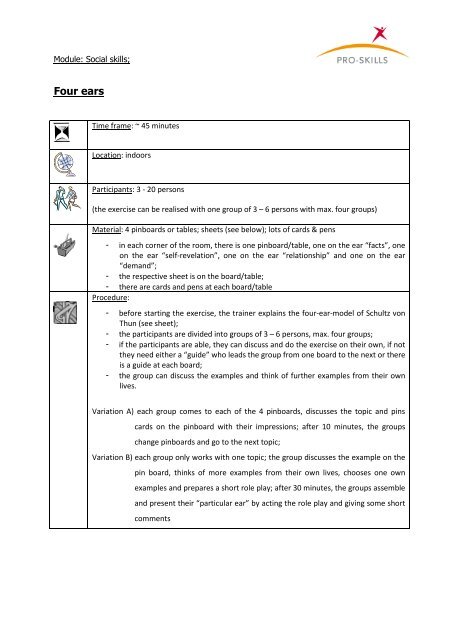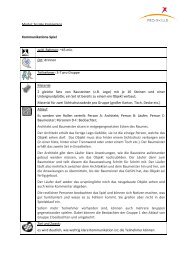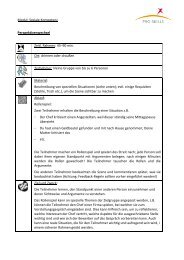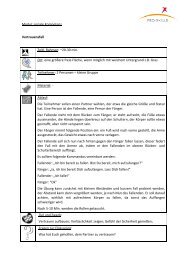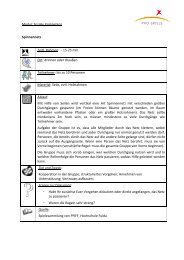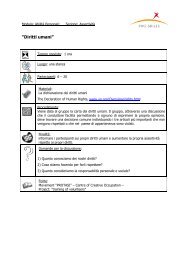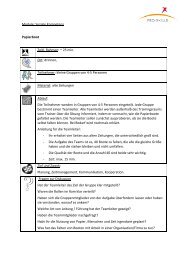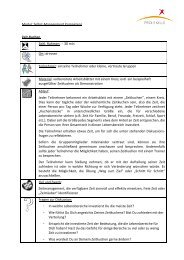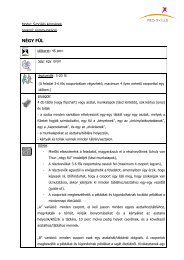Four ears.pdf - Pro-Skills
Four ears.pdf - Pro-Skills
Four ears.pdf - Pro-Skills
Create successful ePaper yourself
Turn your PDF publications into a flip-book with our unique Google optimized e-Paper software.
Module: Social skills;<br />
<strong>Four</strong> <strong>ears</strong><br />
Time frame: ~ 45 minutes<br />
Location: indoors<br />
Participants: 3 - 20 persons<br />
(the exercise can be realised with one group of 3 – 6 persons with max. four groups)<br />
Material: 4 pinboards or tables; sheets (see below); lots of cards & pens<br />
- in each corner of the room, there is one pinboard/table, one on the ear “facts”, one<br />
on the ear “self-revelation”, one on the ear “relationship” and one on the ear<br />
“demand”;<br />
- the respective sheet is on the board/table;<br />
- there are cards and pens at each board/table<br />
<strong>Pro</strong>cedure:<br />
- before starting the exercise, the trainer explains the four-ear-model of Schultz von<br />
Thun (see sheet);<br />
- the participants are divided into groups of 3 – 6 persons, max. four groups;<br />
- if the participants are able, they can discuss and do the exercise on their own, if not<br />
they need either a “guide” who leads the group from one board to the next or there<br />
is a guide at each board;<br />
- the group can discuss the examples and think of further examples from their own<br />
lives.<br />
Variation A) each group comes to each of the 4 pinboards, discusses the topic and pins<br />
cards on the pinboard with their impressions; after 10 minutes, the groups<br />
change pinboards and go to the next topic;<br />
Variation B) each group only works with one topic; the group discusses the example on the<br />
pin board, thinks of more examples from their own lives, chooses one own<br />
examples and prepares a short role play; after 30 minutes, the groups assemble<br />
and present their “particular ear” by acting the role play and giving some short<br />
comments
Goal / purpose:<br />
- participants experience and train the different aspects of understanding and<br />
interpreting a message<br />
- participants get a feeling for their own “preferred” ways of interpreting a message<br />
and become more sensitive when detecting their communication partners’ “strong<br />
<strong>ears</strong>”<br />
Questions for discussion:<br />
see sheets below!<br />
Source: <strong>Pro</strong>-<strong>Skills</strong> 2011 / Schulz von Thun, F. (1991). Miteinander reden 1: Störungen und<br />
Klärungen. Hamburg: rororo.
<strong>Four</strong>-Ear-Model<br />
(Source: Schultz von Thun, German psychologist and communication scientist)<br />
Each message has four aspects and each receiver has four <strong>ears</strong>:<br />
Facts:<br />
mere data & facts of message<br />
Relationship:<br />
information on relationship<br />
between sender & receiver<br />
Self-revelation:<br />
speaker gives information on himself<br />
(motives, values, emotions etc.)<br />
Demand:<br />
wish or demand to the receiver<br />
Example: (black: his message; blue: her interpretation)<br />
Facts:<br />
“I see something green“<br />
“He sees something green“<br />
There’s something<br />
green in the soup!<br />
Self-revelation:<br />
“I don’t know what it is“<br />
“He doesn’t like it“<br />
Relationship:<br />
“I expect that you know what it is”<br />
“He thinks I’m a bad cook!“<br />
Demand:<br />
“Please tell me what it is!“<br />
“I shall only cook things he likes.“<br />
Often people have one ear that’s more sensitive than the others. <strong>Pro</strong>bably you know a<br />
person who always interprets personal criticism or blame in very simple and neutral<br />
messages! This person has a very sensitive ear for relationship-messages.<br />
⇒ It’s not useful to hear only one aspect of a message! We should not interpret aspects of<br />
messages that are not clearly sent by the speaker!
Ear 1: Facts<br />
At first glance, hearing the mere facts of a message seems to be the best<br />
solution for correct understanding. But is this true<br />
The stars are<br />
sparkling so<br />
brightly….<br />
The stars don’t sparkle!<br />
It’s only the light<br />
splitting in the levels of<br />
the atmosphere!<br />
⇒ Get into discussion:<br />
• What happens when people only hear the facts of a message<br />
• Do you know situations or persons in your own life with a strong<br />
tendency to hear facts<br />
• How do you feel when you communicate with these persons
Ear 2: Self-revelation<br />
Example:<br />
[Father looking into the messy room of his son]<br />
Father: “What absolute chaos!! You are a slob!! It’s horrible to live in such a<br />
mess!”<br />
Son: “Did you have a bad day in the office, dad”<br />
⇒ Get into discussion:<br />
• What’s the boy’s benefit of interpreting his father’s statement like<br />
this<br />
• How could the father formulate the sentence so the son with<br />
the self-revelation-ear will understand correctly<br />
• Do you know persons who have a strong tendency to interpret selfrevelation<br />
while communicating
Ear 3: Relationship<br />
Example:<br />
If you don’t like my<br />
What are these<br />
green things in<br />
food, you can go and<br />
have lunch with your<br />
⇒ Get into discussion:<br />
• What is happening in this scene<br />
• What kind of problems will the couple have if the woman always h<strong>ears</strong><br />
with her relationship-ear<br />
• Do you remember situations in your life when you had a strong<br />
relationship-ear What happened, and how did you solve the situation
Ear 4: Demand<br />
Example:<br />
Is there any more<br />
coffee left<br />
I’ll make more coffee<br />
immediately!<br />
⇒ Get into discussion:<br />
• What will happen to people who always interpret demands while<br />
communicating How will other persons probably react to these demandhearers<br />
• Do you know persons in your everyday life who have this strong demandear<br />
• How could you protect yourself from having a strong demand-ear


